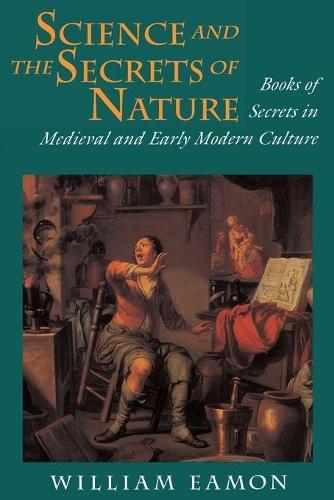Awards
- Winner of AAP/Professional and Scholarly Publishing Awards: History 1994
- Winner of AAP/Professional and Scholarly Publishing Awards: History 1994.
- Winner of Association of American Publishers Award for Best Professional/Scholarly Book in History 1994 (United States)
Overview
By explaining how to sire multicolored horses, produce nuts without shells, and create an egg the size of a human head, Giambattista Della Porta's Natural Magic (1559) conveys a fascination with tricks and illusions that makes it a work difficult for historians of science to take seriously. Yet, according to William Eamon, it is in the ""how-to"" books written by medieval alchemists, magicians, and artisans that modern science has its roots. These compilations of recipes on everything from parlor tricks through medical remedies to wool-dyeing fascinated medieval intellectuals because they promised access to esoteric ""secrets of nature."" In closely examining this rich but little-known source of literature, Eamon reveals that printing technology and popular culture had as great, if not stronger, an impact on early modern science as did the traditional academic disciplines.
Full Product Details
Author: William Eamon
Publisher: Princeton University Press
Imprint: Princeton University Press
Edition: New edition
Dimensions:
Width: 15.20cm
, Height: 3.10cm
, Length: 23.50cm
Weight: 0.680kg
ISBN: 9780691026022
ISBN 10: 0691026025
Pages: 512
Publication Date: 02 June 1996
Audience:
Professional and scholarly
,
College/higher education
,
Professional & Vocational
,
Tertiary & Higher Education
Format: Paperback
Publisher's Status: Active
Availability: Manufactured on demand

We will order this item for you from a manufactured on demand supplier.
Language: English
Reviews
Eamon gives a rich and lively account of authors and writings that were always unacademic, unscrupulous, unprofessional, turbulent, and unsettled: that is to say, an account of the popular or seamy side of medicine and natural knowledge in medieval and early modern times... A book of many unusual topics... Eamon is very learned and writes eloquently. -- A. Rupert Hall Nature Eamon ... provide[s] plenty of material for thought in this multifaceted volume. -- Charles Burnett The New York Times Book Review Unusually well crafted... Eamon has many valuable things to say about science as a sacrament. -- John North The Times Literary Supplement
A scholarly survey of how the concept of secret assisted the development of experimental science from ancient times until the 17th century. The idea of delving into the hidden things of nature and harnessing - or even altering - its processes smacked, in centuries past, more of magic than of science. Eamon (History/New Mexico State Univ.) opens with a nuanced view of the medieval tradition of secrets, its Hellenistic origins, and its Islamic and Scholastic forms. He notes that the empirical approach was not regarded as science because, rather than being purely theoretical, it dealt with the unpredictable and the irrational. Eamon looks at attitudes toward science of, among others, St. Augustine, Albert the Great, and Thomas Aquinas. Eamon is much influenced by Elizabeth Eisenstein's work on the role of printing in exposing classical scientific ideas to scrutiny. He relates how craft knowledge, traditionally kept secret, was divulged by means of vernacular technical textbooks, which contained recipes and resembled modern how-to books. In 16th-century Italy, professors of secrets arose who traveled and published practical and alternative medical advice based on herbs and potions. We encounter colorful characters: Leonardo Fioravanti, a surgeon who, without antisepsis or anesthesia, took out a woman's spleen, though up to that time I had never taken out anything ; the great magus Giambattista Della Porta, who employed occult practices in a purely empirical manner, i.e., without the incantations. In the final section of his book, Eamon describes how this dissemination of knowledge led to the beginnings of the modern empirical attitude, which, he suggests, appealed more to the bourgeois values of the time than did the holistic theoretical concerns of earlier centuries. A feast of detailed scholarship, anecdote, and reflections - touching on a crucial but neglected theme in the development of the western intellectual tradition. (Kirkus Reviews)
Author Information
William Eamon is Professor of History at New Mexico State University.



